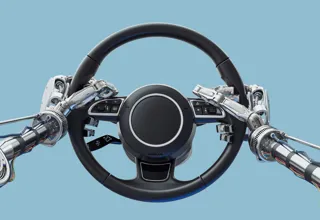A majority of fleet managers have questioned the effectiveness of in-vehicle technologies, such as parking sensors, new research suggests.
The survey, by Alliance Insurance, found that almost three-quarters (70%) of fleet managers either agreed or strongly agreed that technologies such as parking sensors de-skill drivers to the detriment of driver safety.
However, with more than 90% of motor accidents the result of human error, according to RoSPA, fleet decision-makers think that the arrival of autonomous vehicles should make the UK’s roads much safer, with more than half (53%) of respondents saying ‘advanced’ vehicle technologies will deliver road safety benefits.
Interestingly, however, more than one third (35%) of fleets also believe that, if autonomous vehicles become more commonplace, the number of insurance claims will increase.
A study released in America in May, by the Insurance Institute of Highway Safety (IIHS), found the perceived safety benefits of autonomous vehicles could be significantly lower than commonly believed.
It claimed self-driving vehicles might prevent only one-third of crashes if automated systems drive too much like people.
Gerry Ross, head of motor at Allianz Insurance, said: “As our roads and the vehicles using them change over the next decade these technological advances need to be used appropriately.
“Fleet managers need to ensure that their drivers understand the capabilities of the vehicles to maximise the benefits the additional safety features bring.
“It’s important that fleet drivers use the available technology to their advantage to supplement their professional skills.”
The survey results are published in a new report - ‘Fleet Managers, the pressures, challenges and opportunities’ - released today by Allianz Insurance.
It found that 71% of fleet managers say the cost of vehicle repair influences the choice of vehicles in their fleet. Being green is also a key factor with 56% making choices around the composition of their fleet based on protecting the environment.
Fleet managers face a number of pressures and challenges, it suggests, from ensuring the health and safety of their drivers and other road users to addressing environmental concerns and meeting their organisation’s financial targets.
Encouragingly, the research conducted by Allianz found that more than three-quarters (78%) of fleet managers feel they are able to offer their drivers the level of support and training they need to help them drive more safely. However, alongside the one in five (22%) that don’t provide enough support, 70% say they’d like to dedicate more time to explore the support that’s available.
“Insurers and brokers are a great source of risk management information and support,” explained Ross. “As well as providing advice to reduce risk, they can analyse claims data to help fleet managers prioritise where they should take action.
“Given the changes and opportunities ahead, it’s essential that fleet managers, brokers, insurers and vehicle manufacturers work together."
He added: “By sharing knowledge, experience and insight it will ensure that fleet managers are able to minimise the risks and maximise the benefits for their fleets, their drivers and other road users.”

























john4870 - 05/08/2020 12:34
None of this is likely to change until drivers start to drive in sympathy with their vehicle, rather than in spite of them. That is, when they really understand their vehicle and use its abilities as intended!